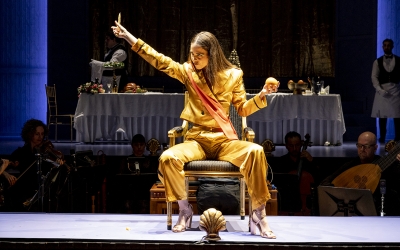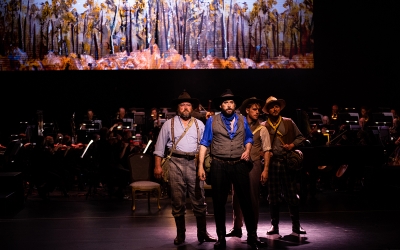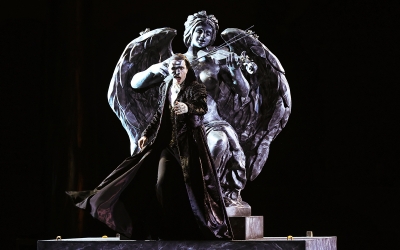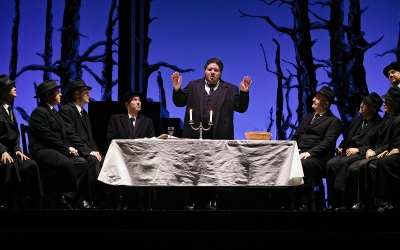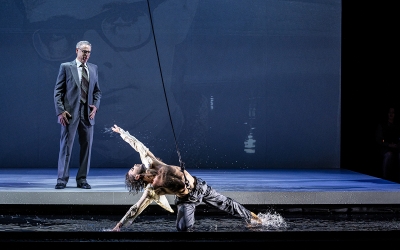Opera
Antonio Cesti and Giacinto Cicognini’s frisky opera, Orontea, begins with an argument between philosophy and love as to who is the stronger. Love heads off to Egypt to create havoc chez the Egyptian Queen Orontea, but at her steamy court the contest seems to be more between the opposing delights of lust and alcohol. Orontea’s determination to remain a virgin queen dedicated to her subjects quickly crumbles on the sudden appearance of the painter Alidoro ...
... (read more)Not long before the 1845 première of Tannhäuser, Richard Wagner was holidaying at the spa of Marienbad. He had with him a copy of the anonymous German epic Lohengrin, and he was possessed. Ever the sensualist, he described the impact in luxurious terms:
... (read more)In the program for the première of Voss in Adelaide in 1986, David Malouf observed:
... (read more)No libretto can reproduce the novel from which it is drawn. A novel, especially a great one, is itself: unique, irreplaceable. The best a libretto can do is reproduce the experience of the book in a new and radically different form, allowing the form itself to determine what the experience will be.
Opera Australia’s Melbourne season began on 4 May with a revival of Elijah Moshinsky’s 1994 production of La Traviata, often seen here before. The season ends on 28 May, with eight more performances. It’s a short work, with four scenes each about thirty minutes long, ideal for those new to opera or keen for melodic relief from election discord.
... (read more)I don’t remember why we were talking about The Phantom of the Opera, the nuclear-proof blockbuster that has rung out from multiple cities every day since its London première in 1986. But I do remember the question posed so absurdly by my psychiatrist that it made me scoff, like the diva Carlotta discovering that she’s been relegated to a minor role in the masked one’s fiendish new score.
‘Do you think you enjoy the musical because you relate to the protagonist?’
... (read more)Sadly, stage productions of Benjamin Britten and Montagu Slater’s opera Peter Grimes are now few and far between in Australia, notwithstanding the fact that the work’s exploration of psychological distress and social ostracisation has lost none of its currency. Britten’s score, while incorporating significant modernist musical elements, also remains both accessible and attractive. And Australia can also boast of having produced two of the finest exponents of the title role in Ronald Dowd and Stuart Skelton (who sang the role in the Sydney Symphony Orchestra’s concert version in 2019).
... (read more)Despite being one of the most successful and influential operas of all time, Ernst Krenek’s Jonny spielt auf (1926) is now something of a stage novelty. We are inclined to assume, perhaps, that the operatic genre it spawned, the Zeitoper, contained the seeds of its own obsolescence. As a new production at the Gärtnerplatztheater in Munich demonstrates, however, the work retains a capacity to shock and inform, as well as to entertain.
... (read more)To say that Fromental Halévy’s opera La Juive (The Jewess) is a problematic work is a gross understatement. From the time of its successful première at the Paris Opéra in 1835 – it is one of the finest examples of French Grand Opera – it has been surrounded by controversy, periods of neglect, particularly during the 1930s, and even outright banning; its subject matter has been found confronting and frequently highly polarising. Although considered blatantly anti-Semitic by some, it was the finest opera of a successful Jewish composer.
... (read more)Neil Armfield’s production of Watershed – a new oratorio by composer Joe Twist and co-librettists Alana Valentine and Christos Tsolkias about the murder of Ian Duncan by police in Adelaide in 1972 and the subsequent cover-up and campaign for homosexual legal reform – is an angry, brave, beautiful, emotionally shattering, and unexpectedly uplifting work.
... (read more)Devotees of Giuseppe Verdi often suggest that the composer’s version of Shakespeare’s Othello is ‘greater’ than the original; a fruitless assertion, but indicative of the esteem in which Verdi’s penultimate opera is held. After Aida (1871), Verdi was enjoying the life of a gentleman farmer. Italian opera of the 1870s and 1880s, however, was facing something of a crisis, threatened by the relentless tide of ‘Wagnerism’, whose theories on opera were embraced by many Italians. Verdi, when asked about his own theory of theatre, drily replied: ‘My theory is that the theatre should be full’.
... (read more)

